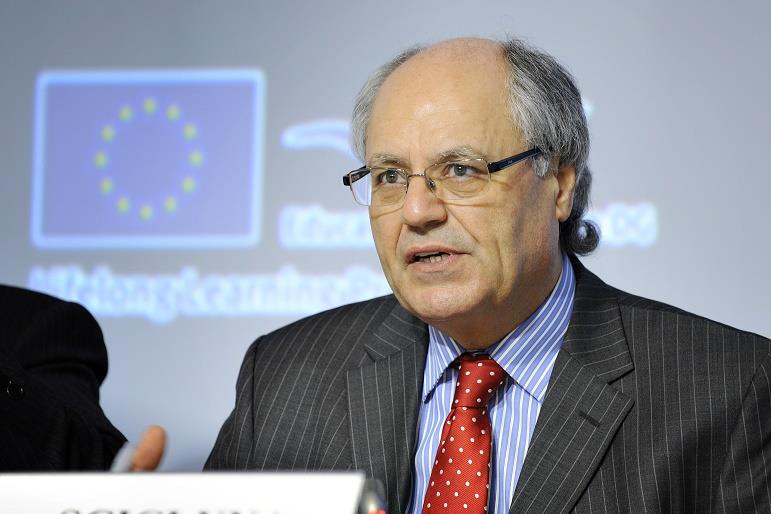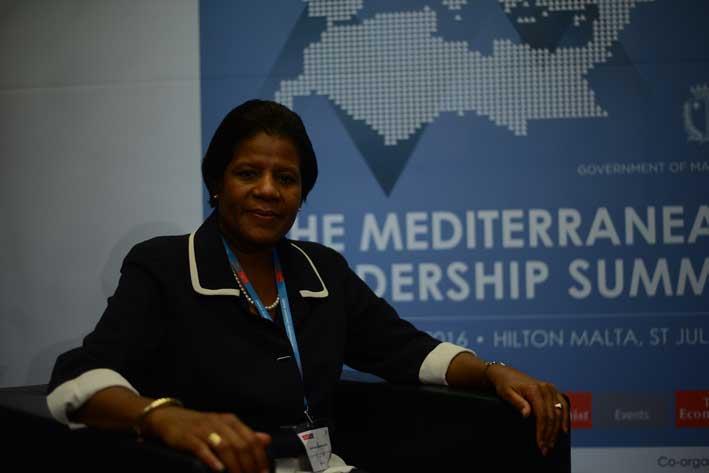World Bank Director Marie Francoise Marie-Nelly, during an interview with The Malta Independent, said that she is in discussions with Maltese Finance Minister Edward Scicluna to find ways to setup a platform between Malta and Maghreb countries to increase collaboration.
Francoise Marie-Nelly joined the World Bank in 1994 and has held a variety of positions focused on the restructuring of public enterprises, support to private sector development, regional integration, and management of the oil sector.
Before assuming the position of World Bank Country Director for the Maghreb and Malta on July 1, 2015, Ms. Marie-Nelly spent four years as Country Director for Nigeria, and previous to that held a number of posts including Country Director for the two Congo (Brazzaville and DRC) from 2008 to 2011 and Senior Program Manager for the Chad-Cameroun Pipeline Project from 2004 to 2007.
While in Malta for the Mediterranean Leadership Summit, she said she was impressed with the quality of Maltese infrastructure and successes over the past decades. “This is my first visit to Malta and I am truly impressed by the good performances of the country in so many areas including education and financial infrastructure.”

“I look forward to sharing Malta’s experience with some of the countries I cover in my assignment, namely Algeria, Tunisia, Libya and Morocco to allow them to learn from the country’s successes. I am currently discussing with the Maltese Minister of finance about ways to develop a South-South collaboration platform between Malta and the Maghreb countries. I think it would be a win-win venture that will be beneficial for Malta as it will be able to continue to consolidate what is has achieved. Hopefully it would create a bridge as Malta is the southern-most EU country”.
“Countries like Algeria, Morocco and Tunisia are aspiring to have a deep trade agreement with the EU, and I think they could learn from Malta’s accession process in terms of, for example, how to use EU as a strong anchor for both fundamental values and technical standards.”
As for North-South Mediterranean trade, she said that for Morocco or Algeria to tap into even 5% or 10% of the EU his market would have a beneficial impact on their economic growth. “We should encourage them to look more closely at the potential benefits of such agreements”.
Asked if there is one particular regional issue (Maghreb countries and Malta) she is concerned about, she highlighted youth unemployment. “There are a large number of unemployed youth and in some countries, the unemployment rate is higher for educated people”.

“The key question is how to create opportunities and an environment that promotes new jobs. At the same time, however, I am quite optimistic as the young population is full of potential and energy. I was in Tunisia two months ago and met two youths involved in the digital economy. They are selling their products through the e-platforms and are making money. But the point is that we need to expand these success stories to other activities, and that requires the public sector to work harder on private sector policy framework”.
She believes there is a need for a two-pronged approach. “You need to expand the number of jobs created. We found that the previous development model, where there was too much concentration of activity in a few hands, did not create sufficient job opportunities. We need more competition, a more open economy which could be done through creating the proper policy environment, adopting new laws and a better framework. At the same time we must also look at sectors with potential for jobs”.
Referring to Tunisia, she explained that it is one of the largest olive oil producers, yet only a small part of this production is exported. “If you are able to create added value locally, then it would create jobs along the logistics and marketing chains and eventually improve the product’s access to markets, including international ones”.
Turning back to the technology industry and e-business, she mentioned meeting with one entrepreneur who told her that he had a business idea, but did not have a credit card that would allow him to access the e-platform. “Thankfully in Tunisia, they have now created that platform”.

“”Countries need to look at the global value chains, identify their competitive advantage and remove doing business constraints to eventually improve their overall competitiveness environment; it is better for enterprises to share a smaller part of a large cake, rather than keeping 90% of a small cake”.
She was also asked whether, given the conflict in countries south of Europe, she has hope for economic stability in the region.
“I think we should keep hope for these countries to overcome conflict and instability and that is exactly what the new strategy of the World Bank in the region is trying to achieve that is to address the underlying causes of conflicts. One of these causes is the social contract between the government and the citizen. By helping create much-needed jobs and improving public services, the aim is to restore trust and build effective participation mechanisms for citizens in the decision-making process.”
Turning to conflict resolution, she highlighted Europe’s action after WW2. “If countries have diplomatic and trade relations with other countries, they will be less inclined to fight. The idea of regional integration and cooperation is one that needs to be pursued. In the Maghreb region though, regional integration is minimal. Intra-trade stands at 5%. And I believe that the private sector has a key role to play in building bridges and promoting the region’s competitive advantage.”
She said that the energy sector could be a good entry point to regional integration in the Region. She added that as the EU made commitments at COP21, the Union can meet some of these commitments through buying renewable energy from North Africa. This could create a win-win situation as North Africa develops more renewable energy such as is the case for Morocco with solar energy production.”
Ms Francoise Marie-Nelly mentioned that financial needs for reconstruction for conflict countries will be enormous as well as the needs to help the displaced communities to cope with their essential needs. It is for this reason that the World Bank is taking a leading role in raising funds to meet the needs of refugees and displaced populations as well as to meet reconstruction needs.”
On the issue of a regional bank for the Mediterranean, she said that what is important, however, is for all the donors to join forces. “In our case, we say that if we put €1 dollar in, we would like to leverage it and bring in €5-€6 from the private sector. This way we can combine forces working with regional development banks, the European partners through the EIB and the EBRD to respond to this this crisis.”